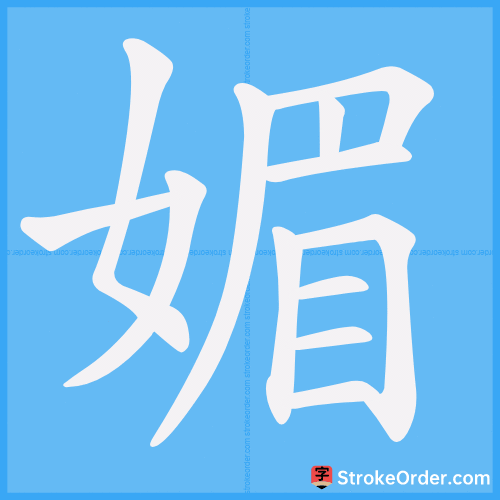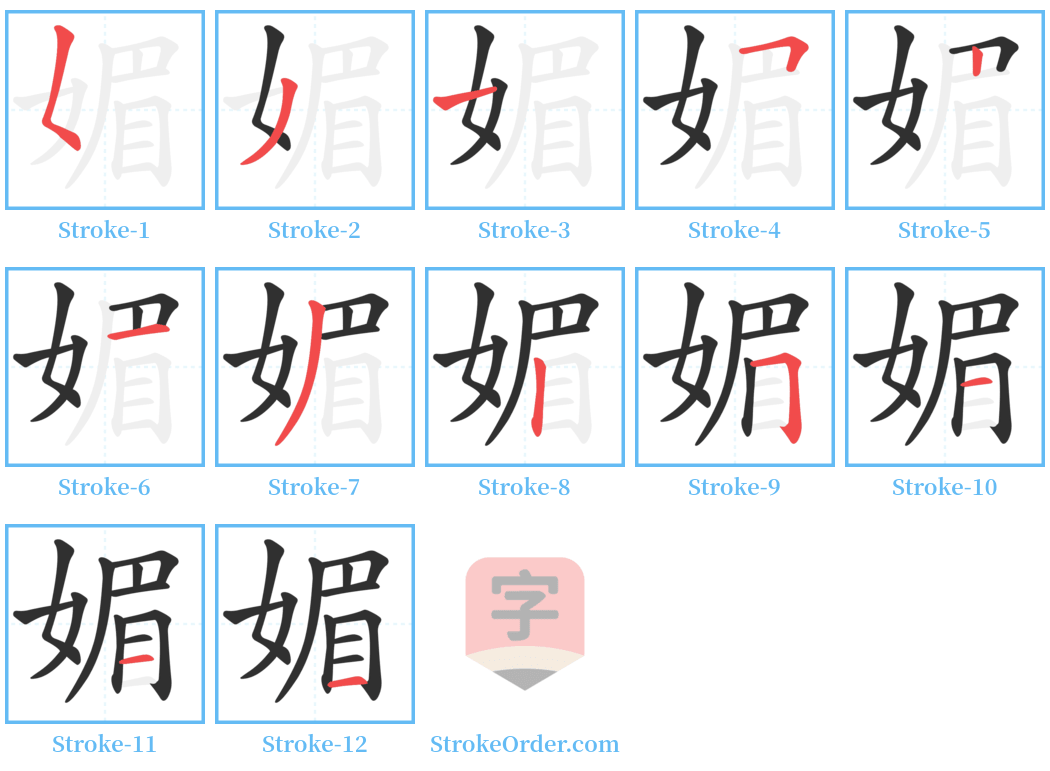媚 Stroke Order
Animated Stroke Order of 媚

Stroke Order Diagrams for 媚

Step-by-Step Handwriting Guide for 媚

Learn to Write Chinese Characters with Video Tutorials
Watch the video of writing the Chinese character "媚", learn the correct stroke order (笔顺) of the character "媚", and master the standard way of writing the character "媚".
Free Printable Handwriting Practice with Stroke Order: 媚
Printable Writing Practice Worksheet of "媚" in Portrait Orientation (Tian Zi Ge)

Printable Writing Practice Worksheet of "媚" in Landscape Orientation (Tian Zi Ge)

Information of 媚
Pinyin
mèi
Radical
女
Strokes
12 strokes
Usage
★★★★★
Definition
flatter / charm
媚 (mèi)
1. 谄,逢迎。
To flatter; to fawn on.
2. 美好,可爱。
Beautiful; lovely.
3. 喜爱。
To love or like.
详细释义:
1. 谄,逢迎:例如~外,~世(to cater to worldly expectations),~眼,~惑,~态,谄~,献~,奴颜~骨。
To flatter or fawn: for instance, flattery, to cater to others' tastes, alluring demeanor, flattering temptation, submissive attitude, buttering up, offering compliments, ingratiating oneself.
2. 美好,可爱:例如~景,明~,秀~,妩~,娇~。
Beautiful; lovely: such as lovely scenery, bright beauty, elegant charm, enchanting allure, delicate beauty.
3. 喜爱:“我既~君姿,君亦悦我颜。”
To love: "I love your appearance, and you also take delight in my face."
---
媚 (mèi) 〈动〉
本义: 爱; 喜爱
Original meaning: Love; to like.
造字法: 形声。从女,眉声。“眉”也有示意作用,表示以目媚人。
Character formation: Phono-semantic compound; composed of "woman" (女) and "eyebrow" (眉), where "eyebrow" serves a suggestive function, indicating a flirtatious glance.
1. 同本义 ([En.] love)
Same as the original meaning ([En.] love).
引:
1. 《说文》:媚,说也。
"Shuo Wen": "媚 means to say."
2. 《诗·大雅·思齐》:思媚周姜。 传:“爱也。”
"Book of Songs: Greater雅." "Thoughts of admiration for Jiang."
3. 《诗·大雅·下武》:媚兹一人。
"Book of Songs: Greater雅." "To adore this one person."
例:例如: 媚子(所爱之人; 爱子); 媚好(爱悦); 媚靥(女子两颊讨人喜欢的酒窝)
Example: For instance, beloved one; darling; charming dimples on a woman's cheeks.
2. 逢迎取悦 ([En.] fawn on; flatter; toady; favor with)
To cater to; to flatter.
引:
1. 《左传·宣公三年》:人服媚之如是。
"Zuo Zhuan": "People are as submissive as this in flattery."
2. 《国语·周语》:若是乃能媚于神。
"National Language": "Only then can one please the spirits."
3. 宋· 辛弃疾《清平乐·村居》:吴音相媚好。
Song Dynasty, Xin Qiji: "The Wu dialect is charmingly beautiful."
例:例如: 谄媚(用卑贱的态度向人讨好); 媚上(取悦主上); 媚色(取悦于人的神态); 媚世(讨好世俗的人); 媚抚(抚爱; 取悦); 媚术(逢迎谄媚的伎俩); 媚爱(取悦; 取宠); 媚灶(比喻阿附权贵)
Example: For instance, sycophancy (to ingratiate with a humble attitude); to please the superior; the demeanor of pleasing others; to fawn upon conventions; to show affection; techniques of flattery; to ingratiate; to curry favor; to flatter those in power.
---
媚 (mèi) 〈形〉
1. 姿态可爱,侧重于婀娜多姿,逗人爱 ([En.] charming; enchanting; fascinating)
Charming; enchanting, emphasizing graceful and appealing appearances.
引:
1. 《尔雅》:媚,美也。
"Erya": "媚 means beautiful."
2. 《广雅》:媚,好也。
"Guangya": "媚 means good."
3. 《吕氏春秋·不屈》:烟视媚行。
"Lüshi Chunqiu": "The misty view is charming."
4. 陆机《文赋》:石韫玉而山辉,水怀珠而川媚。
Lu Ji: "Stone with jade shines, water with pearls is charming."
例:例如: 明媚(景物鲜明可爱; 眼睛明亮动人); 媚好(美好; 娇美); 媚秀(娇美秀丽); 媚曼(娇美); 媚景(谓春景; 美好的景物); 媚娇(容貌声音妩媚动人); 媚趣(优美动人的意趣)
Example: For instance, radiant (vivid and charming scenery; bright and captivating eyes); lovely; beautiful and elegant; delicate; spring scenery; beautiful sights; enchanting appearance and voice; lovely charms.
2. 假借为“魅”。具有魅力,具有诱惑力或吸引力的 ([En.] enchanting)
A homophone for "charm"; possessing charm, allure, or attraction.
引:
1. 《列子·方命》:鬼媚不能欺。
"Liezi": "The spirits are not deceived by charm."
例:例如: 媚人的景色
Example: Charming scenery.
to revere everything foreign and pander to overseas powers (idiom); blind worship of foreign goods and ideas
Input Method for 媚
Pinyin
mei4
Wubi
vnhg
Cangjie
vahu
Zhengma
zmxl
Four Corner
47467
Unicode
U+5a9a
Same Pronunciation Characters